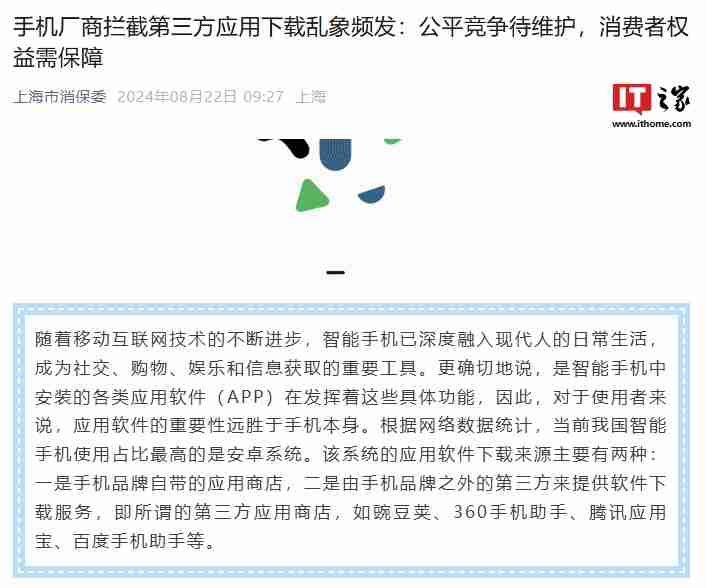 Technology peripherals
Technology peripherals
 It Industry
It Industry
 Shanghai Consumer Protection Commission: Manufacturers cannot use permissions to impose unreasonable restrictions on software from other channels, and consumers have the right to know
Shanghai Consumer Protection Commission: Manufacturers cannot use permissions to impose unreasonable restrictions on software from other channels, and consumers have the right to know
Shanghai Consumer Protection Commission: Manufacturers cannot use permissions to impose unreasonable restrictions on software from other channels, and consumers have the right to know
According to news from this website on August 22, the Shanghai Consumer Protection Commission issued a document today calling on mobile phone manufacturers to block third-party application downloads. Fair competition needs to be maintained and consumer rights need to be protected.


Pixabay Many consumers have encountered this when they use third-party app stores to download and install apps on a daily basis: frequent pop-ups of installation permission windows or risk prompts, long-term risk detection, and redirects to recommended similar apps, and Scenarios that require user authorization or password verification in safe mode.
This site attaches the following views of the Shanghai Consumer Rights Protection Foundation:
Mobile phone root permissions should not be used as a technical means of competition. From the perspective of the technology itself, system root permissions can perform operations such as reading, writing, and modifying mobile phone system files or settings. Also known as super user authority, it is an important factor affecting the safe and stable operation of the mobile phone system.
Therefore, there is no problem in that root permissions cannot be freely opened to third parties. However, at the same time, manufacturers as system providers cannot use their "root permissions" to impose unreasonable restrictions on software from other channels, thus " weaponized” as a means of competition.
If this permission is used as a means of competition, it will not only hinder the fairness of competition and technological development in the application software market, but will ultimately hinder consumers' diversified choices and affect the consumer experience.
Competitive behavior shall not harm the legitimate rights and interests of other operators. From the perspective of market competition, downloading and using application software is essentially a form of service consumption. Mobile phone manufacturers and third-party application providers are both service providers. Their status in the market should be equal, and their rights and obligations in providing services to consumers should also be the same.
In other words, for the sake of consumer information security, the act of giving security tips to reduce risks is reasonable in itself, but the tips themselves should not appear repeatedly or cannot be bypassed, so as to avoid such competitive behavior from actually becoming a mobile phone Manufacturers use their own technological advantages to set up obstacles for other operators to provide services, harming the legitimate rights and interests of other operators.
This kind of reminder has played a certain role in intercepting or hindering other competitors from providing services, just like a restaurant owner installing a gate at the entrance of other people's restaurants. It is obviously contrary to the market economic order and the principle of fair competition.
Consumers’ right to know and choose should be fully exercised. From the perspective of consumer rights protection, the criteria for judging safety prompt information for downloading mobile application software are usually not clearly stated. Consumers have no way of knowing whether such prompt information is given based on technical security testing, or whether it is a unified prompt for non-branded app store software simply by identifying the download source.
Therefore, consumers cannot objectively judge the true security of third-party application software, and may eventually have to give up third-party channels. In fact, consumers have the right to know the true situation of the goods or services they purchase. This is the legal right to know clearly granted to consumers by the Consumer Rights Protection Law (hereinafter referred to as the "Consumer Law").
In addition, Article 11 of the new "Implementation Regulations of the Consumer Rights and Interests Protection Law" (hereinafter referred to as the "Implementation Regulations") also clearly stipulates that operators shall not use technical means to force or covertly force consumers to receive services and restrict consumers' autonomy. choose. Safety tips with unclear standards convey the message that "mobile phone applications from other channels have security risks" in disguise, which may mislead or affect consumers' choices, preventing the full exercise of the right of choice conferred by the Consumer Law and the Implementation Regulations. .
The Shanghai Consumer Rights Protection Foundation calls on relevant departments to further pay attention to various phenomena and problems in current application software downloads, clarify the responsible parties for App security review, and create a consumption environment with a greater sense of gain, satisfaction, and happiness for consumers. and consumption experience.
The above is the detailed content of Shanghai Consumer Protection Commission: Manufacturers cannot use permissions to impose unreasonable restrictions on software from other channels, and consumers have the right to know. For more information, please follow other related articles on the PHP Chinese website!

Hot AI Tools

Undresser.AI Undress
AI-powered app for creating realistic nude photos

AI Clothes Remover
Online AI tool for removing clothes from photos.

Undress AI Tool
Undress images for free

Clothoff.io
AI clothes remover

Video Face Swap
Swap faces in any video effortlessly with our completely free AI face swap tool!

Hot Article

Hot Tools

Notepad++7.3.1
Easy-to-use and free code editor

SublimeText3 Chinese version
Chinese version, very easy to use

Zend Studio 13.0.1
Powerful PHP integrated development environment

Dreamweaver CS6
Visual web development tools

SublimeText3 Mac version
God-level code editing software (SublimeText3)

Hot Topics
 1664
1664
 14
14
 1423
1423
 52
52
 1317
1317
 25
25
 1268
1268
 29
29
 1243
1243
 24
24
 CNCF Arm64 Pilot: Impact and Insights
Apr 15, 2025 am 08:27 AM
CNCF Arm64 Pilot: Impact and Insights
Apr 15, 2025 am 08:27 AM
This pilot program, a collaboration between the CNCF (Cloud Native Computing Foundation), Ampere Computing, Equinix Metal, and Actuated, streamlines arm64 CI/CD for CNCF GitHub projects. The initiative addresses security concerns and performance lim
 Serverless Image Processing Pipeline with AWS ECS and Lambda
Apr 18, 2025 am 08:28 AM
Serverless Image Processing Pipeline with AWS ECS and Lambda
Apr 18, 2025 am 08:28 AM
This tutorial guides you through building a serverless image processing pipeline using AWS services. We'll create a Next.js frontend deployed on an ECS Fargate cluster, interacting with an API Gateway, Lambda functions, S3 buckets, and DynamoDB. Th
 Top 21 Developer Newsletters to Subscribe To in 2025
Apr 24, 2025 am 08:28 AM
Top 21 Developer Newsletters to Subscribe To in 2025
Apr 24, 2025 am 08:28 AM
Stay informed about the latest tech trends with these top developer newsletters! This curated list offers something for everyone, from AI enthusiasts to seasoned backend and frontend developers. Choose your favorites and save time searching for rel



